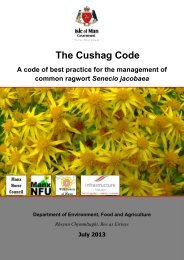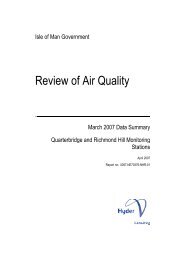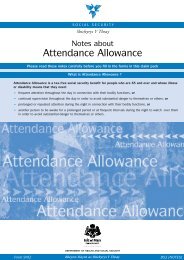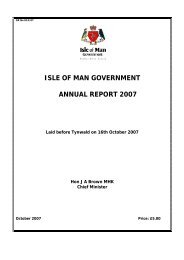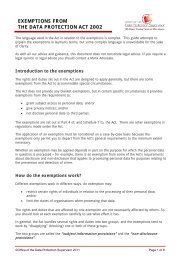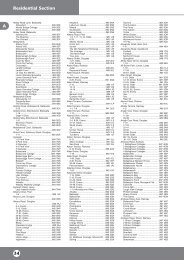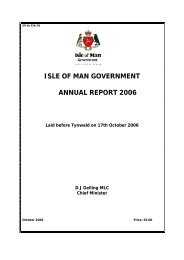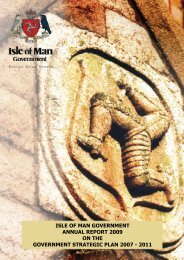Agri News November 2008 - Isle of Man Government
Agri News November 2008 - Isle of Man Government
Agri News November 2008 - Isle of Man Government
You also want an ePaper? Increase the reach of your titles
YUMPU automatically turns print PDFs into web optimized ePapers that Google loves.
Helping <strong>Man</strong>x farmers evolve and grow<br />
<strong>Agri</strong>-<strong>News</strong><br />
<strong>November</strong> <strong>2008</strong><br />
Published by Department <strong>of</strong> <strong>Agri</strong>culture, Fisheries and Forestry<br />
Green light for Countryside<br />
Care Scheme By Ed Clague, <strong>Agri</strong>cultural Policy <strong>Man</strong>ager<br />
Two major milestones have been achieved<br />
for the Countryside Care Scheme as the<br />
Department prepares to submit it for<br />
Tynwald Approval. Firstly, feedback from<br />
the final consultation was very positive<br />
with all major industry bodies supporting<br />
the proposals.<br />
Secondly, Treasury approved the Scheme<br />
at its <strong>November</strong> meeting. The Scheme<br />
will be considered by the Council <strong>of</strong><br />
Ministers later this month before final<br />
approval is sought at December Tynwald.<br />
The Department is arranging three open<br />
meetings before the Tynwald debate so that<br />
farmers can make any final comments.<br />
Details <strong>of</strong> the meetings are on page 4.<br />
Students show their support<br />
for local food<br />
Students on their lunch break at the <strong>Isle</strong><br />
<strong>of</strong> <strong>Man</strong> College were given food for<br />
thought as to why their staple diet should<br />
be underpinned by home grown produce.<br />
As part <strong>of</strong> the College’s Green Week, the<br />
Department laid on a prominent display<br />
in the college foyer, in support <strong>of</strong> local<br />
farmers and food producers.<br />
Deputy Principal Ronald Barr, a farmer’s<br />
son from Shetland in the Scottish <strong>Isle</strong>s<br />
commented “We produce some wonderful<br />
food on the Island and it is important that<br />
we bring this to the attention <strong>of</strong> our<br />
students. The issues concerning the<br />
environment are something that should<br />
play a greater part in the syllabus here.<br />
Who wants to buy beef imported from<br />
Malawi when we have superb beef here?<br />
Our aim should be to make <strong>Man</strong>x the Mark<br />
<strong>of</strong> Excellence.”<br />
DAFF Minister Phil Gawne was encouraged<br />
by the students’ reaction. “We had plenty<br />
<strong>of</strong> very positive<br />
feedback on<br />
the day. It<br />
was great<br />
to hear<br />
so many<br />
words <strong>of</strong><br />
encouragement<br />
especially for our<br />
<strong>Man</strong>x farmers. With<br />
agriculture being such an important part<br />
<strong>of</strong> island life, we feel it is very important<br />
that everyone in the island, <strong>of</strong> all ages, is<br />
encouraged to eat our own home<br />
produced food.”<br />
Index<br />
Minister’s comments 2<br />
Changes at <strong>Isle</strong> <strong>of</strong> <strong>Man</strong> Meats 2<br />
Countryside Care Scheme 3<br />
New agricultural tenancy<br />
legislation enacted 3<br />
What will I get paid on<br />
my land? 4<br />
Farmers’ meetings 4<br />
Countryside Care Scheme:<br />
some changes to note 5<br />
Food Industry braced for<br />
action as consumers give<br />
their verdict 6<br />
Pro<strong>of</strong> <strong>of</strong> the Lamb is in<br />
the Roasting! 7<br />
Back to the Future with the<br />
Advisory Service 7<br />
Strategy report for the<br />
flour sector 8<br />
Laxey Glen Flour Mills at<br />
Bakers’ Fair in Sheffield 8<br />
A Taste <strong>of</strong> the <strong>Isle</strong> <strong>of</strong> <strong>Man</strong> 8<br />
Two vacancies on<br />
Land Court Panel 9<br />
Red meat is positively<br />
good for you 9<br />
Live to dead 9<br />
Suckler Cows<br />
– last date for claims 10<br />
Wool Control opens<br />
at Knockaloe 10<br />
Collection and treatment<br />
<strong>of</strong> waste chemicals 10<br />
Cattle Passports<br />
- Barcodes<br />
- Button Tags<br />
- New Calf Ear Tags In Stock 11<br />
Bovine Tuberculosis 11<br />
Market Trends 12<br />
A detailed summary <strong>of</strong> the Consultation feedback and a list <strong>of</strong> frequently<br />
asked question and answers can be found on pages 3 and 4.
2<br />
Decoupling is now the baseline across Europe and evidence is growing<br />
that the decoupling process is a positive one for agriculture.<br />
Phil Gawne, MHK<br />
Minister’s comments<br />
The new structures for agriculture, which<br />
we have considered and debated as an<br />
industry for so long, are now starting to be<br />
put in place. The final draft <strong>of</strong> the<br />
Countryside Care Scheme was released<br />
last month for its final consultation before<br />
going to Tynwald. I am grateful to all those<br />
who took the time to contact the<br />
Department with their comments and<br />
opinions. It would appear that the<br />
extensive discussions undertaken in<br />
preparing the scheme have paid <strong>of</strong>f, with all<br />
the major industry representative bodies<br />
supporting the proposals, albeit with some<br />
minor concerns or suggested amendments.<br />
The Scheme (now slightly changed to take<br />
account <strong>of</strong> feedback) has been approved<br />
by Treasury. The Council <strong>of</strong> Ministers will<br />
consider the Scheme shortly, before going<br />
to Tynwald in December.<br />
The Department will now concentrate on<br />
ensuring that, if approved, the Scheme will<br />
be implemented on 1st April 2009 with as<br />
little disruption as possible. Workshops<br />
are being planned over the winter which<br />
will explain the Countryside Care Scheme<br />
and address farmers’ issues in a practical,<br />
straightforward manner.<br />
The implementation <strong>of</strong> the <strong>Agri</strong>cultural<br />
Tenancies Act <strong>2008</strong> from 12 <strong>November</strong> is<br />
also another major step in creating a<br />
better environment for agriculture. The<br />
new Act allows landlords and tenants to<br />
enter into new flexible arrangements and<br />
will hopefully encourage new land to<br />
become available for letting, or for existing<br />
tenanted land to be let for longer periods.<br />
The new Act is also good news for any<br />
farmers considering retiring, as they can<br />
now let their land with the confidence, that<br />
if necessary they can get their land back,<br />
without unintentionally establishing<br />
extended security <strong>of</strong> tenure. Farms<br />
currently let under 1969 tenancy<br />
arrangements are unaffected by the<br />
new Act.<br />
There have been several comments<br />
recently regarding the European Union’s<br />
commitment to decoupling and claims that<br />
the EU is considering re-linking payments<br />
to support. Howard Quayle and I travelled<br />
to a European Conference last month to<br />
find out first hand what European policy<br />
makers are currently thinking. The<br />
Conference was addressed by Mariann<br />
Fischer-Boel, the EU <strong>Agri</strong>culture<br />
Commissioner and the French Minister for<br />
<strong>Agri</strong>culture who left us in no doubt that<br />
recoupling support was not and indeed<br />
would not be considered at this stage.<br />
The Commissioner made absolutely clear<br />
EU thinking that decoupling is now the<br />
baseline across Europe and evidence is<br />
growing that the decoupling process is a<br />
positive one for agriculture.<br />
Finally, I would like to welcome Jack<br />
Yardley, the new Executive Chairman <strong>of</strong> <strong>Isle</strong><br />
<strong>of</strong> <strong>Man</strong> Meats. Jack has a strong<br />
background in manufacturing and marketing<br />
and I am confident that <strong>Isle</strong> <strong>of</strong> <strong>Man</strong> Meats<br />
will benefit greatly from his appointment.<br />
Hon Phil Gawne MHK<br />
Minister DAFF<br />
Changes at <strong>Isle</strong> <strong>of</strong> <strong>Man</strong> Meats By Ed Clague, <strong>Agri</strong>cultural Policy <strong>Man</strong>ager<br />
<strong>Isle</strong> <strong>of</strong> <strong>Man</strong> Meats has appointed Jack<br />
Yardley as its Executive Chairman for an<br />
initial period up to the end <strong>of</strong> February<br />
2009 with the possibility <strong>of</strong> extending the<br />
position after that.<br />
Jack brings with him a wealth <strong>of</strong><br />
experience in manufacturing and<br />
marketing, having previously been the<br />
Chairman and <strong>Man</strong>aging Director <strong>of</strong> the<br />
Ronaldsway Shoe Company.<br />
Jack will be working with the existing<br />
team and has a wide remit to review all<br />
company operations. His first priority,<br />
however, is to review <strong>Isle</strong> <strong>of</strong> <strong>Man</strong> Meats<br />
strategy regarding the potential loss <strong>of</strong> the<br />
red meat derogation and the impact <strong>of</strong><br />
decoupling. He sees there are four<br />
essential strands to the business, being<br />
the producers, the plant, marketing and<br />
the relationship with <strong>Government</strong>. The<br />
whole operation is jeopardised if any <strong>of</strong><br />
these strands do not operate effectively.<br />
Jack has a lot <strong>of</strong> experience in<br />
manufacturing which can be transferred to<br />
<strong>Isle</strong> <strong>of</strong> <strong>Man</strong> Meats and said “A production<br />
unit is a production unit, be that a shoe or<br />
a carcass. It needs to be processed,<br />
marketed and sold at a pr<strong>of</strong>it. I believe<br />
that for any business to remain successful<br />
it must provide a sufficient return to allow<br />
further investment in the future”<br />
<strong>Agri</strong>-<strong>News</strong> <strong>November</strong> <strong>2008</strong>
3<br />
Countryside Care Scheme<br />
– some questions and answers By Kim Etherton, Countryside Care Scheme Project Officer<br />
1. Why are these changes being made?<br />
Answer: The industry asked for change<br />
and it has taken quite a while to define<br />
what was needed! Problems included:<br />
• rising levels <strong>of</strong> support but falling<br />
numbers <strong>of</strong> farmers<br />
• failure <strong>of</strong> subsidies to keep pace with<br />
rising input costs<br />
• farmers bound to production and<br />
lacking the freedom to diversify<br />
• production not always aligned with<br />
consumer requirements and therefore<br />
not attracting adequate prices<br />
• loss <strong>of</strong> red meat derogation from 2011<br />
It has taken over two and a half years <strong>of</strong><br />
consultation to identify the problems and<br />
suggest the solutions. The continued<br />
payment <strong>of</strong> larger production subsidies<br />
was not sustainable and would have<br />
ended any hope <strong>of</strong> extending derogation.<br />
The Andersons Report, commissioned by<br />
MNFU and DAFF, concluded that “no<br />
change” was not an option. The Vision for<br />
<strong>Man</strong>x <strong>Agri</strong>culture was therefore drawn up<br />
and was approved by Tynwald in April<br />
<strong>2008</strong>. The vision lists seven key areas <strong>of</strong><br />
work designed to enable <strong>Man</strong>x farmers to<br />
plan for the next 10 years – the<br />
Countryside Care Scheme is one <strong>of</strong> them.<br />
All seven are needed to bring about the<br />
changes required - more pr<strong>of</strong>itable<br />
businesses, new entrants, freedom to<br />
diversify and meet customer demands, a<br />
sustainable food supply for the Island and<br />
a well managed countryside.<br />
2. What’s happening in Europe?<br />
Answer: Changes like these are well<br />
underway in Europe. Where decoupling<br />
has been implemented, livestock numbers<br />
have fallen BUT prices to the producer<br />
have risen. As food production has<br />
shifted in favour <strong>of</strong> meeting customer<br />
needs pr<strong>of</strong>itably, retailers such as<br />
supermarkets have had to pay producers<br />
a more realistic price in order to maintain<br />
their supplies. To take better advantage<br />
<strong>of</strong> export possibilities, <strong>Man</strong>x farmers need<br />
to be able to respond to changes in the<br />
global food market – and the new Scheme<br />
will help achieve this.<br />
3. How will all this help me?<br />
Answer: You will continue to receive the<br />
same level <strong>of</strong> support as in the past for a<br />
number <strong>of</strong> years, depending on which<br />
sector <strong>of</strong> agriculture you work in. Your<br />
level <strong>of</strong> support or Historic Entitlement has<br />
been based on past subsidy payments –<br />
and a fund, the National Reserve, has<br />
been set up to help applicants who feel<br />
that the introduction <strong>of</strong> the new Scheme<br />
has disadvantaged them.<br />
• Payments will be made in July, October<br />
and April <strong>of</strong> the following year. In 2009,<br />
50% <strong>of</strong> your claim will be made in July<br />
– both the proportion and timing <strong>of</strong> the<br />
payments will be an improvement on<br />
the past schemes for many farmers.<br />
• There is time built into the Scheme to<br />
allow you to reflect on your farming<br />
and to make changes in light <strong>of</strong> the<br />
new Scheme and other initiatives.<br />
• Unlike the situation across Europe,<br />
every effort is being made to maintain<br />
the same budget over the next ten<br />
years – it is being cut elsewhere. The<br />
proposed rates <strong>of</strong> payment to farmers<br />
are also higher than elsewhere – to<br />
reflect the specific challenges faced by<br />
farming on a small island.<br />
4. What about the processors?<br />
Answer: It is recognised that there are<br />
strengths and weaknesses in having just<br />
one creamery, mill and abattoir. Additional<br />
budget has been allocated to support the<br />
Meatplant so that it can pay better returns<br />
to farmers and reviews <strong>of</strong> it, the Creamery<br />
and Laxey Glen Mills are being completed to<br />
help them and you best adapt to the future.<br />
5. How do I know what the<br />
consumer wants?<br />
Answer: Budget has also been allocated<br />
to finding out what consumers want and<br />
marketing initiatives which will help you<br />
know what to produce to meet their<br />
needs – and to do so pr<strong>of</strong>itably.<br />
Information, help and advice will be made<br />
available – speakers at this winter’s talk<br />
programme have lots <strong>of</strong> ideas to share.<br />
6. It all sounds very complicated<br />
– where can I get help?<br />
Come to a farmer’s meeting or workshop;<br />
contact the Advisory Service and the Field<br />
Officers at Knockaloe (842335) or the<br />
Scheme staff at Rose House<br />
(687343/344). Read your handbook<br />
when you receive it and use the website<br />
http://www.gov.im/daff/countryside<br />
_care<br />
New <strong>Agri</strong>cultural Tenancy Legislation enacted<br />
By Ed Clague, <strong>Agri</strong>cultural Policy <strong>Man</strong>ager<br />
The <strong>Agri</strong>cultural Tenancies Act <strong>2008</strong> has<br />
been enacted. The Act provides a major<br />
overhaul <strong>of</strong> the letting arrangements for<br />
agricultural property by creating a flexible<br />
and lasting legal framework where<br />
landlords and tenants may let land on<br />
freely negotiated terms but with key<br />
safeguards. Within that framework the<br />
terms and conditions <strong>of</strong> the new tenancies<br />
are to be for negotiation between<br />
landlords and tenants, who must decide<br />
what is right for them. In particular, the<br />
new legislation does not impose any<br />
extended security <strong>of</strong> tenure beyond the<br />
specific length <strong>of</strong> tenancy agreed between<br />
landlord and tenant. Existing agricultural<br />
tenancies which are already in existence<br />
will be unaffected by the new legislation<br />
and remain subject to the <strong>Agri</strong>cultural<br />
Holdings Act 1969.
4<br />
What will I get paid on my land? By Kim Etherton, Countryside Care Project Officer<br />
Given the impact that different land types<br />
will have on the value assigned to Historic<br />
and flat rate area payments to be made<br />
from the Countryside Care Scheme,<br />
farmers will want to know how their land<br />
has been classified. With the proviso that<br />
the Scheme has yet to be approved by<br />
Tynwald, here’s an update on when you<br />
will find out more.<br />
DAFF has sought help in (a) deciding what<br />
might be the most appropriate way <strong>of</strong><br />
classifying land on the Island and (b)<br />
applying the chosen method to<br />
landholdings. The Scottish <strong>Agri</strong>cultural<br />
College (SAC) successfully bid for both<br />
pieces <strong>of</strong> work and reported on a land<br />
classification system in July. They have<br />
been on the Island this October and are due<br />
to report on how all land parcels should be<br />
classified by the end <strong>of</strong> <strong>November</strong>.<br />
The chosen land classification system is to<br />
assign land to one <strong>of</strong> two categories:<br />
Above or Below the Mountain Line. It was<br />
sent out to farmers’ groups for comments<br />
and a Policy has now been drawn up and<br />
was included in the Countryside Care<br />
Scheme consultation process which ended<br />
on 23 October. A copy can be seen at<br />
http://www.gov.im/daff/countryside<br />
_care or by contacting DAFF on 687343.<br />
DAFF will be contacting all farmers before<br />
Christmas in order to explain how their land<br />
has been assigned to one or both <strong>of</strong> these<br />
two categories and re-calculating the<br />
Historic Entitlement statement which all<br />
farmers received in May. Based on that<br />
statement and any subsequent changes<br />
agreed with DAFF, Historic Entitlements will<br />
be divided in the ratio <strong>of</strong> 1:6. That is, Land<br />
Above the Mountain Line will attract a<br />
payment which is a sixth <strong>of</strong> the value <strong>of</strong><br />
Land Below the Mountain Line. The same<br />
ratio will be applied when calculating flat<br />
rate area payments in the future. The<br />
payments will be referred to as Class 1 or 2<br />
payments and a current assessment is that<br />
they will be around £14 and £85<br />
respectively. These should not be<br />
considered as cast in stone however,<br />
because there are a number <strong>of</strong> other factors<br />
which have to be taken into account:<br />
• The exact value <strong>of</strong> Class 1 and 2<br />
payments will depend on the number<br />
<strong>of</strong> eligible acres entered into the<br />
Scheme. The budget will be divided by<br />
this number in order to set the rates to<br />
be paid. Remember that the<br />
Countryside Care Scheme is voluntary<br />
so farmers have to apply to receive<br />
funding from it.<br />
• The final payment to individual farmers<br />
will be a balancing payment and will<br />
reflect any penalties incurred by that<br />
farmer. If unspent funds remain in the<br />
budget, these will be paid out pro rata<br />
to everyone, in accordance with the<br />
Historic Entitlements and land type held.<br />
• Deciding the eligible acres on each<br />
farm will take place as part <strong>of</strong> the<br />
application for a payment from the<br />
Countryside Care Scheme next year.<br />
The application period will be from 30<br />
March to 11 May 2009. Farmers will<br />
make a self assessment, using<br />
guidelines which the Department will<br />
issue early next year. All farms will be<br />
inspected over the next five years and<br />
penalties may be applied to over and<br />
under declarations. Intentionally<br />
claiming a payment on ineligible land<br />
in order to increase income could be a<br />
criminal <strong>of</strong>fence.<br />
Finally, if farmers believe their land has<br />
been wrongly classified, they can appeal.<br />
An appeal must be submitted within 30<br />
days <strong>of</strong> notification by DAFF – guidelines<br />
and an appeal form will be available to<br />
help farmers with this process. There will<br />
also be a number <strong>of</strong> workshops to help<br />
with this important (and complex) part <strong>of</strong><br />
the Countryside Care Scheme.<br />
Watch out for details on Farm Text and in<br />
the media.<br />
Farmers meetings – Countryside Care Scheme<br />
At these meetings, you can find out about<br />
the final details <strong>of</strong> the Scheme as it will be<br />
presented to Tynwald in December. Come<br />
along to hear more and ask questions.<br />
Lunch will be provided on 1st December<br />
and refreshments at the other meetings.<br />
To help with catering, please let us know<br />
if you would like to attend – call 685838<br />
or email jane.tierney@gov.im Technical<br />
sessions on specific aspects <strong>of</strong> the<br />
Scheme will be held in February.<br />
Thursday 4th<br />
December 8pm at<br />
<strong>Agri</strong>culture<br />
House, Douglas<br />
Friday 12th December<br />
2.30pm at<br />
Ginger Hall Hotel,<br />
Sulby<br />
Dates are:<br />
Monday 1st December<br />
12 noon at the<br />
Falcon’s Nest Hotel, Port Erin<br />
"Seasons Greetings to all our readers. A well known<br />
Marown Farmer found a novel use for his round bales<br />
last Christmas."<br />
<strong>Agri</strong>-<strong>News</strong> <strong>November</strong> <strong>2008</strong>
5<br />
Countryside Care Scheme: some changes to note<br />
By Kim Etherton, Countryside Care Project Officer<br />
A number <strong>of</strong> meetings have been held<br />
with farmers’ groups and the Industry<br />
Advisory Committee to go through the<br />
final details <strong>of</strong> the Scheme and its<br />
associated documents. These can all be<br />
found by going to http://www.gov.im/daff/<br />
countryside_care/ or contacting DAFF<br />
on 687343. Based on the responses<br />
received during this final consultation<br />
period, a number <strong>of</strong> changes have been<br />
made to reflect farmer concerns. Other<br />
points raised have not required changes<br />
to the text but will need more explanation<br />
in the Farmer’s Handbook and workshops.<br />
Revised documents are now on the website.<br />
In the meantime, here are some <strong>of</strong> the<br />
key points:<br />
Countryside Care Scheme<br />
The Scheme will contain a section setting out<br />
the frequency and month in which payments<br />
will be made - these are as explained in last<br />
month’s <strong>Agri</strong> <strong>News</strong>. In 2009, 50% <strong>of</strong> the<br />
applicant’s estimated payment will be made<br />
by the end <strong>of</strong> July, 25% by the end <strong>of</strong><br />
October and a final balancing payment will<br />
be made no later than the end <strong>of</strong> April 2010.<br />
From 2010 onwards, the percentage will be<br />
33% each time (July, October, April).<br />
Authorised personnel will have the power<br />
to enter a farm for a number <strong>of</strong> Scheme<br />
related purposes at “all reasonable times”.<br />
In practice, prior warning will be given in<br />
most cases so that the farmer and<br />
Inspector can work co-operatively. The<br />
Farmer’s Handbook will clearly explain this<br />
so that farmers know what to expect for<br />
the vast majority <strong>of</strong> cases. However,<br />
spot checks will be made if DAFF has<br />
reason to believe that Scheme rules have<br />
been breached and the matter needs to<br />
be investigated immediately.<br />
The Scheme will now give DAFF powers to<br />
suspend requirements to meet cross<br />
compliance standards in the event <strong>of</strong><br />
exceptional circumstances faced by<br />
farmers across the Island. Waterlogged<br />
fields and this summer come to mind!<br />
The Scheme stated that claims for Historic<br />
Entitlement payments <strong>of</strong> less than £500<br />
would not be paid – the figure will now<br />
be £250.<br />
Farmers considering the transfer <strong>of</strong> their<br />
Historic Entitlements should note that high<br />
value entitlements will be capped at £300<br />
per entitlement if transferred.<br />
Cross Compliance Standards<br />
and Penalties<br />
This contains a number <strong>of</strong> tables explaining<br />
how penalties for breaches <strong>of</strong> cross<br />
compliance will be categorised. Farmers<br />
should note that the quoted outcomes are<br />
indicative only – the outcome <strong>of</strong> an<br />
inspection will depend on what the<br />
Inspector finds on the day, on the<br />
individual farm. Inspectors will work to a<br />
manual which will be designed to result in<br />
a pragmatic and practical outcome, whilst<br />
upholding the need for farmers to meet<br />
cross compliance standards. For instance,<br />
heathland fires adjacent to a road which<br />
have clearly resulted from a carelessly<br />
discarded cigarette are very unlikely to lead<br />
to a Countryside Care Scheme applicant<br />
being penalised.<br />
Farmers need to follow various Codes <strong>of</strong><br />
Practice in order to meet cross compliance<br />
standards – the <strong>Man</strong>x Hedgerow Code <strong>of</strong><br />
Best Practice for Standard 16, for<br />
example. DAFF has undertaken to review<br />
and update these once the Countryside<br />
Care Scheme gets underway in 2009.<br />
Some changes to the text on<br />
archaeological heritage sites have been<br />
made to remind farmers that damage to<br />
any buildings or sites listed on the<br />
National Heritage Register is a criminal<br />
<strong>of</strong>fence under <strong>Man</strong>x law and may also<br />
result in penalties being applied.<br />
Standard 10 (Undergrazing) has been<br />
amended to remind farmers that Japanese<br />
Knotweed must not be controlled by<br />
cutting as this just helps the plant to<br />
spread. It also clarifies that, where cutting<br />
is used for grassland management, it<br />
should be for the purposes <strong>of</strong> harvesting<br />
livestock feed.<br />
Land Classification<br />
The Policy has been amended to make<br />
clear that areas covered with bracken<br />
where stock can be grazed, or where<br />
there is sufficient grass growth to make<br />
this possible, can be included as eligible<br />
land when making an application to the<br />
Countryside Care Scheme.<br />
National Reserve<br />
The definition <strong>of</strong> New Entrant has been<br />
expanded to include the need for applicants<br />
in this category to have an agricultural<br />
qualification or relevant experience and the<br />
requirement to have evidence <strong>of</strong> the<br />
subsidy support which they could have<br />
expected to earn from agricultural<br />
production, has been strengthened.<br />
Finally, the Scheme is on target for<br />
presentation to Tynwald at the December<br />
sitting so we will send out a text to let<br />
you all know the outcome.
6<br />
Food Industry braced for action as consumers give<br />
their verdict By Heather Smallwood, Marketing Consultant<br />
The future direction <strong>of</strong> the local food<br />
industry is set for a major review as<br />
producers plan their response to the most<br />
in-depth study ever undertaken <strong>of</strong> the <strong>Isle</strong><br />
<strong>of</strong> <strong>Man</strong>’s consumers.<br />
The call for action, which will have a<br />
direct impact on the farming community<br />
as well as all the Island’s key<br />
stakeholders, follows recent publication <strong>of</strong><br />
this summer’s comprehensive survey <strong>of</strong><br />
the Local <strong>Isle</strong> <strong>of</strong> <strong>Man</strong> Food Market. In a<br />
wide ranging questionnaire, commissioned<br />
by the <strong>Agri</strong>cultural Marketing Society, a<br />
random sample <strong>of</strong> 1500 households was<br />
canvassed throughout the island in a bid<br />
to gather a detailed assessment <strong>of</strong> what<br />
consumers really think about <strong>Man</strong>xproduced<br />
food.<br />
The significance <strong>of</strong> the survey should not<br />
be underestimated. To ensure its validity,<br />
the questionnaire’s content was<br />
formulated from a series <strong>of</strong> high level<br />
workshops held earlier this year involving<br />
representatives from the <strong>Government</strong>, the<br />
<strong>Man</strong>x NFU, The <strong>Agri</strong>cultural Marketing<br />
Society, food producers, retailers, Organic<br />
Working Party and I Love <strong>Man</strong>x.<br />
Now that consumers have delivered their<br />
verdict, as a leading body in the <strong>Isle</strong> <strong>of</strong><br />
<strong>Man</strong> food industry, the <strong>Agri</strong>cultural<br />
Marketing Society is preparing to evaluate<br />
the findings with DAFF in order to draw<br />
up recommendations to key stakeholders<br />
in the local food industry.<br />
“The feedback gathered through these<br />
questionnaires from consumers is critical<br />
in helping to understand some <strong>of</strong> the<br />
ways in which the local food industry can<br />
adapt to meet the challenges that lie<br />
ahead” said <strong>Agri</strong>cultural Marketing Society<br />
Chairman, Ge<strong>of</strong>f Taggart. “The research<br />
will help <strong>Man</strong>x food producers base their<br />
decisions on objective, reliable and<br />
relevant information, specific to our<br />
local market.”<br />
The decision to carry out such a wide<br />
ranging survey resulted from the concern<br />
that until now “very little market<br />
information is readily available on the<br />
specific changing needs <strong>of</strong> the consumer<br />
in the <strong>Isle</strong> <strong>of</strong> <strong>Man</strong>.”<br />
• Of the 1500 questionnaires distributed<br />
and available online, responses came<br />
back from over 500 people across the<br />
Island – a healthy 30% <strong>of</strong> the total<br />
sent out. This included a mix <strong>of</strong> both<br />
<strong>Man</strong>x nationals and others living on<br />
the Island.<br />
• Overall, the survey showed there was<br />
widespread consumer support and<br />
appreciation <strong>of</strong> local food. <strong>Man</strong>x meat,<br />
milk, vegetables, eggs, cheese and<br />
bread, for instance, are bought by<br />
more than 75% <strong>of</strong> shoppers on the<br />
Island. And a similar number indicated<br />
that they <strong>of</strong>ten or always bought local<br />
produce, with 7 out <strong>of</strong> every 10 <strong>of</strong><br />
those sampled saying it was important<br />
or very important to buy locally<br />
produced meat. Ratings <strong>of</strong> local<br />
produce in terms <strong>of</strong> value for money<br />
and quality were very high.<br />
• Significantly, the research revealed<br />
that quality, price and freshness<br />
were the three most important<br />
factors to consumers.<br />
• The survey revealed that the major<br />
food outlets like Shoprite, Tesco,<br />
Marks and Spencer, Co-op and Spar<br />
accounted for the vast majority <strong>of</strong><br />
food purchases with 50% <strong>of</strong> those<br />
sampled spending at least £71<br />
per week on food shopping.<br />
Nearly 60% <strong>of</strong> respondents<br />
said they bought ready-made<br />
meals from time to time.<br />
• It also appears that <strong>Isle</strong> <strong>of</strong> <strong>Man</strong><br />
shoppers pay close attention<br />
to food labelling with 96% <strong>of</strong><br />
respondents saying they<br />
checked food labels - a<br />
significantly higher percentage<br />
than in the UK. Furthermore,<br />
the <strong>Agri</strong>cultural Marketing<br />
Society has already<br />
concluded: “Evidence is strong<br />
for the development <strong>of</strong> a “certification<br />
label” to help consumers know the origin<br />
<strong>of</strong> foods, with almost 90% in favour <strong>of</strong><br />
regulations on what should be allowed to<br />
be called “<strong>Man</strong>x”. Meanwhile, having the<br />
three legs <strong>of</strong> <strong>Man</strong> on labelling was also<br />
seen as very persuasive.<br />
• In addition, it emerged that 75% <strong>of</strong><br />
those surveyed found <strong>Man</strong>x produce<br />
easy to identify and over half were<br />
aware <strong>of</strong> the ‘I Love <strong>Man</strong>x’ campaign.<br />
• There was also evidence <strong>of</strong> a growing<br />
popularity <strong>of</strong> organic produce, with 20%<br />
saying it was important for their food to<br />
be organic, with a small proportion<br />
saying they would choose organic in<br />
favour <strong>of</strong> locally produced foods.<br />
With the review now in full swing, further<br />
announcements to key stakeholders are<br />
expected in the near future. For further<br />
information, please contact the<br />
<strong>Agri</strong>cultural Marketing Society:<br />
agsoc1@manx.net<br />
Your Guide to <strong>Man</strong>x Produce will be<br />
distributed to every household on<br />
the Island in December.<br />
See also brand new website<br />
www.ilovemanx.org<br />
<strong>Agri</strong>-<strong>News</strong> <strong>November</strong> <strong>2008</strong>
7<br />
Pro<strong>of</strong> <strong>of</strong> the Lamb is in the Roasting!<br />
By Andrew Macdonald, <strong>Agri</strong>cultural Adviser<br />
The first, in what will hopefully be a<br />
regular series <strong>of</strong> Beef and Sheep events at<br />
Knockaloe Farm, has been held. Some <strong>of</strong><br />
the recent Loaghtan crossing trial lamb<br />
was roasted and gave an extremely tasty<br />
and sociable conclusion to a very<br />
interesting afternoon.<br />
Joining advisers Andrew Macdonald and<br />
Chris Kneale were Harper Adams beef<br />
specialist Simon Marsh, and animal health<br />
consultant Kythe Mackenzie. The<br />
afternoon opened with the 55 farmers<br />
attending, finding out about the financial<br />
performance <strong>of</strong> Knockaloe Farm over the<br />
past 5 years, and how margins had been<br />
improved by INCREASING spending on<br />
feed and fertiliser, and simultaneously<br />
DECREASING fixed costs.<br />
Before heading out to the farm, the<br />
comparison between cost <strong>of</strong> growing<br />
cattle in <strong>2008</strong> was made with that in<br />
2004. Despite the unprecedented and<br />
massive increase in fuel and fertiliser<br />
costs, the margins from beef cattle at<br />
Knockaloe were actually better in <strong>2008</strong><br />
than 2004 because <strong>of</strong> the improvement in<br />
finished beef price.<br />
Heading out onto the farm, the farmers<br />
saw the conclusions <strong>of</strong> the winter feeding<br />
trial, where steers and SYBs finished<br />
within 14 days <strong>of</strong> each other on the same<br />
diets, and with similar margins. They also<br />
saw the plans for the following winter with<br />
fodder crops, and the same difficulties as<br />
every other farm with the weather<br />
conditions in <strong>2008</strong> delaying sowing <strong>of</strong><br />
these crops.<br />
During the tour, whilst looking at the<br />
Knockaloe suckler herd, the large financial<br />
gains to be had from better management<br />
<strong>of</strong> suckler herd fertility were graphically<br />
illustrated, <strong>of</strong>ten amounting to more than<br />
£100 per cow per year.<br />
The last few Loaghtan cross lambs were<br />
still in the fields to see, with surprisingly<br />
good overall physical and financial<br />
performance from the 1st crosses. The<br />
last stop on the tour was Kythe<br />
Mackenzie, telling farmers about the<br />
benefits <strong>of</strong> knowing what the worm<br />
burden in different livestock around the<br />
farm was. The afternoon concluded with<br />
an excellent roast dinner kindly cooked by<br />
John Faulds, the main part <strong>of</strong> which was<br />
some <strong>of</strong> Knockaloe’s own Loaghtan cross<br />
mule lamb.<br />
The next Knockaloe Beef and Sheep event<br />
will be in the Spring <strong>of</strong> 2009.<br />
Back to the Future with the Advisory Service<br />
By Chris Kneale, <strong>Agri</strong>cultural Adviser<br />
The Advisory Service based at<br />
Knockaloe, sadly does not own a crystal<br />
ball, so they can’t see exactly what the<br />
future holds. They can however help with<br />
what the future brings!<br />
The Advisory Service, made up <strong>of</strong> Andy<br />
Macdonald and Chris Kneale, works<br />
with the industry both directly on farm at<br />
one to one level and with groups <strong>of</strong><br />
farmers and industry stakeholders. The<br />
winter meetings programme sees a wealth<br />
<strong>of</strong> experience in the form <strong>of</strong> guest<br />
speakers from all over the UK engaging in<br />
some interesting discussions with groups<br />
<strong>of</strong> farmers keen to find that extra edge.<br />
(Look out for updates in the Examiner and<br />
via the farm text service)<br />
The Advisory Service was recently<br />
asked to the <strong>Man</strong>x Beef Producers Group<br />
AGM to update members on initiatives<br />
that can be easily implemented on farm to<br />
measure the performance <strong>of</strong> their<br />
businesses and identify areas where<br />
margins could be improved. Two such<br />
initiatives include: Suckler cow fertility<br />
benchmarking and Analysing animal<br />
grading results (Beef and lamb).<br />
Leading on from these two initiatives is<br />
the ability <strong>of</strong> the Advisory Service to<br />
help producers with rationing animals. A<br />
poor harvest and rising feed costs has<br />
seen rationing animals correctly become<br />
even more important to producing<br />
efficiently and pr<strong>of</strong>itably. The Advisory<br />
Service can help to analyse feeds and<br />
formulate rations looking both at<br />
nutritional value <strong>of</strong> feeds and their value<br />
to suit individual requirements.<br />
When it comes to crops and soil fertility<br />
both Andy and Chris are qualified to<br />
provide independent fertiliser (FACTS)<br />
and agronomy (BASIS) advice. As prices<br />
<strong>of</strong> fertilisers and sprays increase the<br />
need, timing, dose rate, formulation<br />
and integrated crop management<br />
techniques can all have an effect on<br />
production yields, reducing input costs<br />
and increasing margins.<br />
The Advisory Service can also help<br />
individuals with financial budgets and<br />
cash flows either analysing specific<br />
enterprises or carrying out whole farm<br />
business reviews.<br />
As things undoubtedly look set to change<br />
the Advisory Service can help farmers<br />
identify, implement and understand the<br />
implications <strong>of</strong> change to their businesses.<br />
All contact between the Advisory<br />
Service and clients is completely<br />
confidential and the Advisory Service<br />
welcomes all enquiries whether practical,<br />
policy, enterprise specific, financial or on a<br />
whole farm level. Contact Andy or Chris at<br />
Knockaloe on 842335.
8<br />
Strategy report for the flour sector<br />
By Ed Clague, <strong>Agri</strong>cultural Policy <strong>Man</strong>ager<br />
Laxey Glen Mills and DAFF have<br />
commissioned a report into the Flour<br />
sector, which is due before Christmas.<br />
SAC has been commissioned to deliver a<br />
Business Strategy report that will make<br />
recommendations on the future structure,<br />
pricing policy, product development,<br />
marketing and collaboration required for a<br />
sustainable <strong>Man</strong>x flour sector.<br />
A team from SAC visited the Island in<br />
early October and met with growers,<br />
Laxey Glen Mills, Ramsey Bakery, private<br />
bakeries and retailers.<br />
The report will cover:<br />
• Potential market opportunities on and<br />
<strong>of</strong>f the Island<br />
• Pricing structures and quality standards<br />
• Risk management strategies<br />
• Benchmarking <strong>of</strong> processes<br />
• Review <strong>of</strong> the supply chain<br />
• The viability <strong>of</strong> grower numbers and<br />
production levels<br />
• Potential new customers for the mill<br />
Laxey Glen Flour Mills at Bakers’ Fair in Sheffield<br />
By Colin Brown, Chairman, Laxey Glen Mills<br />
Laxey Glen Mills’ presence was quite a<br />
surprise to many people attending the<br />
Bakers’ Fair exhibition in Sheffield and<br />
raised a lot <strong>of</strong> interest.<br />
The exhibition, which is run in conjunction<br />
with the Annual Baking and Confectionery<br />
Competition <strong>of</strong> the Richemont Club <strong>of</strong><br />
Great Britain, an organisation for bakers<br />
and the baking industry, was a one-day<br />
event on Sunday 19 October. Although<br />
small, the exhibition was sufficient<br />
to produce genuine interest in the<br />
Mill and its products from some<br />
21 visitors.<br />
The Mill anticipates that they may be able<br />
to form some productive sales<br />
relationships from the contacts made - a<br />
baker in Kendal was particularly keen,<br />
viewing the Island as a "close neighbour"<br />
and therefore a logical supplier, and a<br />
couple <strong>of</strong> companies showed interest in<br />
distributing the Mill's products throughout<br />
the UK.<br />
The Bakers' Fair is not a large event and<br />
is open only to bakers and the industry in<br />
general. This meant that we were able to<br />
chat directly to potential customers, most<br />
<strong>of</strong> whom had not heard <strong>of</strong> us, but the<br />
interest stemming from our flours' quality<br />
and its traceability was noticeable. Overall<br />
we were very satisfied with the venture<br />
and hope it brings forth some UK business<br />
for us.<br />
A Taste <strong>of</strong> the <strong>Isle</strong> <strong>of</strong> <strong>Man</strong><br />
By Audrey Fowler, Marketing Officer<br />
‘A Taste <strong>of</strong> the <strong>Isle</strong> <strong>of</strong> <strong>Man</strong>’ was the<br />
brainchild <strong>of</strong> the Friends <strong>of</strong> Laxey School<br />
to raise funds for the school but this is no<br />
ordinary ‘school cookbook’ - as it says on<br />
the cover, it’s more <strong>of</strong> a ‘celebration <strong>of</strong><br />
<strong>Man</strong>x produce’.<br />
Knowing where food comes from is<br />
becoming increasingly important to many<br />
families and every recipe featured includes<br />
at least one <strong>Man</strong>x food item that can<br />
transform an ordinary dish into something<br />
really special.<br />
This is a book that clearly shows what a<br />
special place our Island is, not only in<br />
terms <strong>of</strong> the quality, traceability and range<br />
<strong>of</strong> our home-grown food but also how<br />
<strong>Agri</strong>culture contributes to such a rich and<br />
diverse environment.<br />
‘A Taste <strong>of</strong> the <strong>Isle</strong> <strong>of</strong> <strong>Man</strong>’ will be widely<br />
available from mid-<strong>November</strong> in<br />
bookshops and tourist outlets throughout<br />
the Island. Recommended retail price is<br />
£9.99, with all proceeds to Laxey School.<br />
DAFF were pleased to be one <strong>of</strong> the<br />
main sponsors.<br />
For further information contact:<br />
fols@manx.net<br />
<strong>Agri</strong>-<strong>News</strong> <strong>November</strong> <strong>2008</strong>
9<br />
Two vacancies on Land Court Panel By Ed Clague, <strong>Agri</strong>cultural Policy <strong>Man</strong>ager<br />
There are currently two vacancies for<br />
Landlords representation on the Land Court.<br />
The Land Court is a statutory body set up<br />
under the provisions <strong>of</strong> the <strong>Agri</strong>cultural<br />
Holdings Act. It consists <strong>of</strong> three persons,<br />
the Chairman generally being the High<br />
Bailiff. DAFF is required to deliver to the<br />
Chief Secretary a list <strong>of</strong> 12 persons having<br />
a sound working knowledge <strong>of</strong> agricultural<br />
practice. Six <strong>of</strong> the 12 are required to be<br />
Landlords (or to fairly represent such<br />
Landlords) the other six are tenants or<br />
persons who represent tenants. It is<br />
therefore important that whoever appears<br />
on the ‘panel’ is extremely knowledgeable<br />
and experienced in agricultural matters.<br />
The Land Court only becomes constituted<br />
once an application has been received.<br />
Thereafter in general terms the High<br />
Bailiff is usually appointed as Chairman<br />
and there will be one person nominated<br />
by the Landlord (usually but not<br />
necessarily from the ‘Landlords’ list) and<br />
also one person from the tenants’ list<br />
(again there is nothing to stop a tenant<br />
actually choosing from the Landlords’ list<br />
and vice versa.) A suitable time and place<br />
for the hearing <strong>of</strong> the application will be<br />
fixed. The majority <strong>of</strong> matters do not<br />
take longer than a day or so to be heard.<br />
The members <strong>of</strong> the panel are entitled to<br />
the fixed remuneration <strong>of</strong> £65 per day.<br />
The matters coming before the Tribunal<br />
are many and varied. Section 19 <strong>of</strong> the<br />
Act sets them out in detail. However the<br />
most common cases before the Tribunal<br />
involve arguments about the proper rent<br />
to be charged; fixing the amount <strong>of</strong><br />
compensation that might be awarded<br />
under the Act; whether or not a Landlord<br />
is entitled to claim possession if for<br />
example he requires it for his own or<br />
family use; whether a certificate <strong>of</strong> bad<br />
husbandry should be granted to the<br />
Landlord; and a determination <strong>of</strong> any<br />
question arising out <strong>of</strong> the terms <strong>of</strong> any<br />
tenancy agreement.<br />
The Tribunal would not generally hear on<br />
more than four separate applications<br />
each year.<br />
Anyone interested in applying should<br />
contact Mr Ed Clague, <strong>Agri</strong>cultural Policy<br />
<strong>Man</strong>ager Tel: 687344 or email<br />
ed.clague@gov.im<br />
Red meat is positively good for you<br />
(Extract taken from the Daily Mail – 16th September <strong>2008</strong>)<br />
If you’re considering giving up meat for<br />
health reasons, it’s important to look closely<br />
at the real science rather than the headlines.<br />
Some scientific studies have shown a slight<br />
increase in the risk <strong>of</strong> cardiovascular disease<br />
associated with high red meat intake, but most<br />
<strong>of</strong> these studies involved all sorts <strong>of</strong> meat.<br />
They didn’t take into account the enormous<br />
difference between living on fatty, lowmeat-content,<br />
processed foods (such as<br />
cheap sausages, pâtés, burgers, pies) and<br />
eating a simply cooked lean steak, say.<br />
For not all meats are equal when it comes<br />
to health risks – indeed, lean red meat is<br />
positively good for you. It’s a message<br />
that no one’s really promoting.<br />
However, lean steak contains ‘healthier’ fats,<br />
such as monounsaturated and<br />
polyunsaturated fatty acids which can reduce<br />
cholesterol and the risk <strong>of</strong> heart disease.<br />
Red meat contains other nutrients, such as<br />
omega-3s – yes, the ones we’re always told<br />
to get from oily fish! – B vitamins and<br />
selenium, all good for the heart.<br />
Meat is also a great source <strong>of</strong> protein –<br />
adults need this for energy, children also<br />
need it for growth. Red meat is by far the<br />
best source <strong>of</strong> easily absorbed iron (for<br />
healthy blood).<br />
Live to Dead<br />
By David Cain, Meat Grader<br />
The next live to dead workshop is for<br />
lambs on Thursday 18th December. If<br />
you are interested in attending this or<br />
any future events please contact the<br />
Meat Plant on 473679.
10<br />
Suckler Cows – last date for claims<br />
By Frank Harrison, <strong>Agri</strong>cultural Support Schemes Administrator<br />
With the introduction <strong>of</strong> the Countryside<br />
Care Scheme in April 2009 all <strong>of</strong> the<br />
production based support schemes will<br />
begin to wind down. Amongst the first<br />
will be the Beef Cow Premium Scheme,<br />
otherwise known as the Suckler Cow<br />
Scheme, which also includes the Hill Cow<br />
payments as the marginal premium.<br />
Previously this Scheme has entailed<br />
registration, every <strong>November</strong>, <strong>of</strong> cows that<br />
were to calve in the following year. The<br />
current intention (which has yet to be<br />
ratified by Tynwald) is to continue the<br />
2007-08 Scheme year through to the end<br />
<strong>of</strong> January 2009. If you are not currently<br />
registered in the Scheme, but would like<br />
to be, for the remaining part <strong>of</strong> the<br />
Scheme prior to decoupling , please<br />
contact the Department on 687304.<br />
The Scheme draws to an end in January.<br />
Cows that you intend to claim Beef Cow<br />
Premium for must have given birth and<br />
their calves been registered by midnight<br />
on the 30th January 2009. To be eligible<br />
for payment all other criteria must then also<br />
be met. The final claim forms for this Scheme<br />
will then be sent in mid. February and mid.<br />
March. If you have any questions in relation<br />
to this or the specific eligibility criteria please<br />
call me, 687304.<br />
Wool Control opens at Knockaloe By Andrew Willoughby, Field Officer<br />
The Drill Hall site in Douglas was vacated in<br />
April and works were undertaken at the “factory<br />
shed” at Knockaloe to make it ready for<br />
accepting wool from the <strong>2008</strong> clip.<br />
Our local wool grader Paul Kelly, (a<br />
familiar face driving the horse trams in<br />
the summer) sadly passed away in April<br />
leaving us short <strong>of</strong> an experienced person<br />
to grade. The previous grader, Malcolm<br />
Hudson stepped into the breach and<br />
graded the last two intakes <strong>of</strong> wool.<br />
Wool Control opened on 22nd <strong>of</strong><br />
September with a new grader who is<br />
working on a contract coming over to<br />
grade for three weeks and returning home<br />
while the wool is baled and shipped out to<br />
auction. Gwyn Jones previously graded<br />
wool at the Denbigh depot in North Wales<br />
before the British Wool Board closed it<br />
down as part <strong>of</strong> a restructuring plan.<br />
There are 16 <strong>Man</strong>x grades <strong>of</strong> wool<br />
compared with 40 + in the UK. Three<br />
days training by Malcolm was all that was<br />
required to get Gwyn familiar with the<br />
new <strong>Man</strong>x grades and their terminology.<br />
The first intake <strong>of</strong> wool saw over 46 tonnes <strong>of</strong><br />
wool handled and graded. The wool price for<br />
<strong>2008</strong> is set out below. Prices for all but the hill<br />
breeds have shown a modest increase.<br />
Grade Auction Price B.W.M.B <strong>2008</strong> 2007<br />
2007-08 £ operating costs £ Purchase price £ Purchase price £<br />
2 Ewe 0.805 0.305 0.50 0.495<br />
2 Hog 0.865 0.305 0.56 0.515<br />
5 Ewe 0.835 0.305 0.53 0.50<br />
Fine heavy 0.811 0.305 0.51 0.42<br />
Kear 0.576 0.305 0.27 0.16<br />
Loaghtan 1.46 0.305 1.15 0.657<br />
Cross 1 0.82 0.305 0.51 0.46<br />
Cross heavy 0.79 0.305 0.49 0.422<br />
Black-face 2 0.711 0.305 0.41 0.42<br />
Black-face grey 0.58 0.305 0.27 0.342<br />
Fine broken 0.47 0.305 0.16 0.257<br />
Scotch-broken 0.305 0.05 0.05<br />
Dark Grey 0.48 0.305 0.18 0.05<br />
Blue Leicester 1.38 0.305 1.07 0.64<br />
Fine Heavy 0.865 0.305 0.56 0.475<br />
Winter shorn<br />
Collection and treatment <strong>of</strong> waste chemicals<br />
By Andrew Willoughby, Field Officer<br />
Anyone who needs to get rid <strong>of</strong> unwanted<br />
pesticides should call SITA (IOM) Ltd,<br />
Energy From Waste Plant, Richmond Hill,<br />
Douglas on 695260 and wait for option 6<br />
–and speak to the compliance <strong>of</strong>ficer.<br />
SITA (IOM) Ltd will collect and package on<br />
farm any unwanted pesticides and send it <strong>of</strong>f<br />
island for treatment and then incineration.<br />
They would require the following<br />
information:<br />
Trade name, Quantity, Chemical names<br />
(active ingredients), any hazardous data<br />
A charge will be made dependant on quantity<br />
and whether the chemical will need to be<br />
treated before incineration or not.<br />
<strong>Agri</strong>-<strong>News</strong> <strong>November</strong> <strong>2008</strong>
11<br />
Cattle Passports – Barcodes By Jo Brew, Animal Health Officer<br />
The eagle-eyed<br />
amongst you may<br />
have noticed<br />
a couple <strong>of</strong><br />
additions to your<br />
cattle passports...<br />
Since 26<br />
September <strong>2008</strong><br />
all calf births<br />
have been issued<br />
with passports<br />
containing barcodes:<br />
Bovine Tuberculosis<br />
By Stuart Jaques, Veterinary Officer<br />
Research update.<br />
Samples from all suspected TB<br />
breakdowns in the Island are sent to the<br />
Veterinary Laboratories Agency (UK) for<br />
analysis. A positive laboratory test is the<br />
key finding that confirms disease on the<br />
holding. Further complex investigations<br />
are carried out on the DNA <strong>of</strong> positive<br />
samples to identify which “family” <strong>of</strong><br />
similar bovine tuberculosis bugs is<br />
involved in each outbreak.<br />
This is very useful to Animal Health as<br />
breakdowns that are caused by different<br />
families are most definitely not related. The<br />
table below shows that we have had five<br />
different families <strong>of</strong> TB since 2001<br />
(inclusive) in a total <strong>of</strong> twelve cattle<br />
incidents. This strongly suggests that we<br />
have repeatedly imported disease, despite<br />
the testing applied to imports in the past.<br />
As a direct result <strong>of</strong> this information Animal<br />
Health has increased the level <strong>of</strong> protection<br />
for the Island by applying the gamma<br />
interferon blood test to all imports since<br />
<strong>November</strong> 2007 (in addition to the usual<br />
skin testing) – no animal has failed to date.<br />
The table and chart also show that only<br />
two “families” <strong>of</strong> TB have been found<br />
more than once on the Island: 9Y has<br />
been found six times between 2001 and<br />
2006; 9Z three times between 2002 and<br />
2007. However, a great deal <strong>of</strong><br />
investigation in conjunction with local<br />
farmers has yet to identify any movement<br />
<strong>of</strong> cattle that links any two <strong>of</strong> these<br />
incidents – it may be each incident is the<br />
result <strong>of</strong> a separate import from particular<br />
regions <strong>of</strong> the UK (the “families” <strong>of</strong> TB<br />
present vary between regions).<br />
Number <strong>of</strong> farms with confirmed TB<br />
2001-<strong>2008</strong><br />
Key TB "family" Number <strong>of</strong><br />
farms affected<br />
Polecat survey<br />
65 1<br />
9X 1<br />
9Y 6<br />
9Z 3<br />
80 1<br />
Animal Health is currently investigating<br />
whether wildlife may be involved in the<br />
spreading <strong>of</strong> disease. To this end a survey<br />
<strong>of</strong> “roadkill” polecats is being undertaken,<br />
in order to see whether bovine TB can be<br />
found and, if so, which “family” <strong>of</strong> TB it is.<br />
Polecats have been chosen for this work<br />
because they are at the top <strong>of</strong> the wildlife<br />
food chain in the island and are known to<br />
be susceptible to bovine TB. It is important<br />
to stress that there is no local evidence to<br />
suggest that polecats are actually involved<br />
in spreading TB on the Island.<br />
The Animal Health Division is very keen<br />
to obtain more polecats for analysis.<br />
Samples should be fresh and not heavily<br />
squashed! Anyone experienced in<br />
handling such items can drop them in by<br />
arrangement to Animal Health, Knockaloe<br />
or Forestry at St.Johns with details <strong>of</strong><br />
where found. All samples should be in a<br />
leak-pro<strong>of</strong> bag (bin bags are ideal).<br />
Anyone who feels they may be able to help<br />
with such a survey, but needs guidance in<br />
the safe handling <strong>of</strong> specimens can contact<br />
Stuart Jaques to discuss the matter further.<br />
call Stuart Jaques on 685844<br />
The top barcode contains details <strong>of</strong> the<br />
breed code, sex, date <strong>of</strong> birth and UBAN<br />
(ear tag number) <strong>of</strong> the animal; whilst the<br />
middle barcode details the UBAN.<br />
Animals which are not eligible for the food<br />
chain (for example: older animals born in the<br />
<strong>Isle</strong> <strong>of</strong> <strong>Man</strong> prior to 1/1/1998 and those older<br />
animals with no date <strong>of</strong> birth) will not have<br />
the barcodes printed on their passports.<br />
The barcodes have been added at the request<br />
<strong>of</strong> the <strong>Isle</strong> <strong>of</strong> <strong>Man</strong> Meats who plan to utilise<br />
the barcodes to assist in the administrative<br />
processing <strong>of</strong> cattle through the Meat Plant.<br />
Cattle Passports<br />
– Button Tags<br />
Animal Health is pleased to announce a<br />
further addition to the range <strong>of</strong> new tag<br />
types available to cattle keepers.<br />
In addition to the ‘Primary / Primary’ and<br />
‘Primary / Secondary’ choice, cattle<br />
keepers will have the option <strong>of</strong> requesting<br />
a Primary / Secondary Button tag<br />
combination for their calves.<br />
The Primary / Button tags will be available<br />
for ordering from September 2009 as tags<br />
for the forthcoming calving period are<br />
already in stock.<br />
If you would like to change your current<br />
preference to any <strong>of</strong> the combinations<br />
mentioned above please<br />
contact Andrew Robertson<br />
on 685616.<br />
Example <strong>of</strong> button tag<br />
Cattle Passports<br />
– New Calf Ear<br />
Tags In Stock<br />
New calf ear tags are now in stock and are<br />
ready for collection from the Cattle Passport<br />
Centre, Top Floor, Rose House, 51-59<br />
Circular Road, Douglas.<br />
Please contact Andrew Robertson<br />
on 685616 for<br />
further information
12<br />
Market Trends By Chris Kneale, <strong>Agri</strong>cultural Adviser<br />
Details <strong>of</strong> how the graphs have been calculated can be found at: www.gov.im/daff/<strong>News</strong>/agricultural.xml<br />
Cattle. UK prices appear to have stalled<br />
over recent weeks as, industry pundits<br />
suggest, consumers start to feel the<br />
effect <strong>of</strong> the “credit crunch”. Supply <strong>of</strong><br />
beef is also relatively plentiful as farmers<br />
de-stock for the winter and possibly cash<br />
in on those perceived peaked prices. IoM<br />
base prices for beef (differing slightly<br />
between steer and heifer, and by about<br />
26p/Kg between SYB and steer) have<br />
remained relatively constant for 3<br />
months now, although some producers<br />
have benefited from supply management<br />
contract premiums over and above this<br />
level. Historically demand increases in<br />
the run up to the Christmas period and<br />
processors may find that the supply <strong>of</strong><br />
beef isn’t so forthcoming at current or<br />
reduced prices.<br />
Lamb. Prices have declined as supplies<br />
peak and despite remaining higher than<br />
last years price, the industry must not<br />
forget that the lamb sector was hammered<br />
by FMD this time last year. Commentators<br />
point out that lamb prices are not that far<br />
further ahead than 2006 prices.<br />
Pigs. IoM pork price lifted by 10p/kg in<br />
August to reflect the higher production<br />
costs faced on the Island, and this has<br />
put the IoM price back ahead <strong>of</strong> UK<br />
prices but not by the same margin as<br />
this time last year. UK commentators<br />
suggest that there are still potential price<br />
increases to be gained in the UK market<br />
before Christmas. Whether these occur,<br />
and if they are reflected in IoM prices<br />
remains to be seen.<br />
Milk. The importation <strong>of</strong> liquid milk into<br />
the UK signals undersupply, yet with<br />
European cheese prices below UK prices,<br />
industry commentators suggest that if<br />
UK cheese prices are forced down to<br />
match European prices then UK farm<br />
gate prices for milk are likely to fall. The<br />
August IoM farmgate price was some<br />
1.46ppl litre below that <strong>of</strong> the UK,<br />
seemingly diverging again after having<br />
been very close to UK price in July <strong>of</strong> this<br />
year. On a world scale, NZ and USA<br />
yields look to be down and the effect on<br />
supply and demand <strong>of</strong> this are predicted<br />
by some to bode well for future long<br />
term pr<strong>of</strong>itability.<br />
Contact Information<br />
Department <strong>of</strong> <strong>Agri</strong>culture, Fisheries and Forestry<br />
Rose House, 51 – 59 Circular Road, Douglas IM1 1AZ<br />
Telephone: 685835 Fax: 685851 e-mail: daff@gov.im Web: www.gov.im/daff<br />
If you would prefer to receive an electronic link, rather than paper copies through the post, please let<br />
Frank Harrison know by phoning 687304 or email frank.harrison@gov.im<br />
<strong>Agri</strong>-<strong>News</strong> <strong>November</strong> <strong>2008</strong>


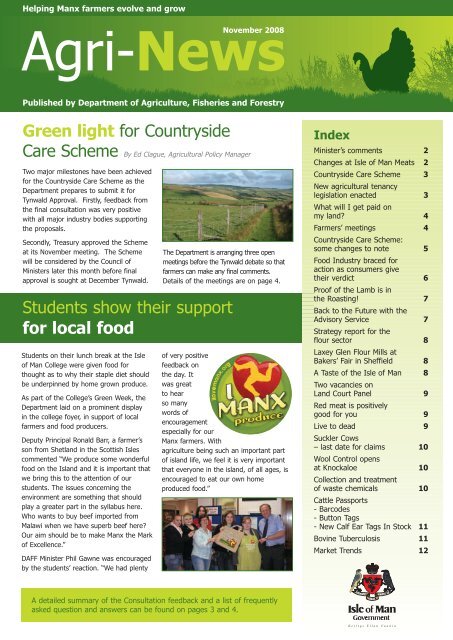
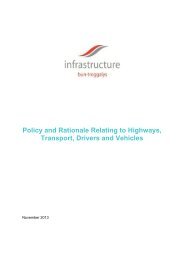
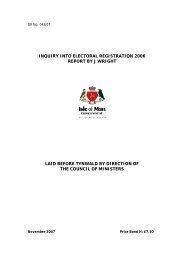
![Smeaton v Equifax CA[2013] EWCA Civ 108](https://img.yumpu.com/22052507/1/184x260/smeaton-v-equifax-ca2013-ewca-civ-108.jpg?quality=85)
